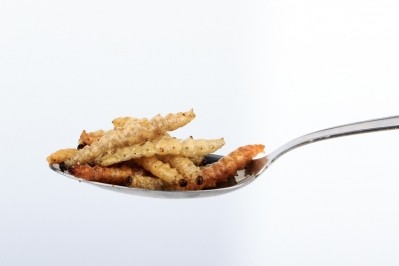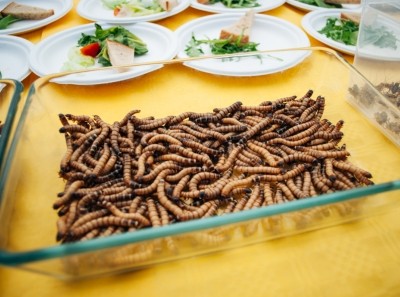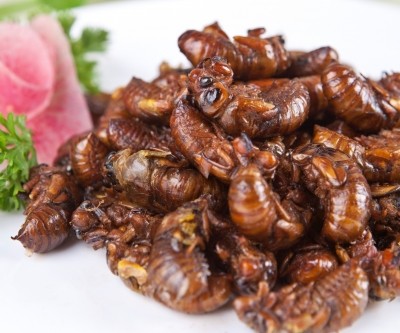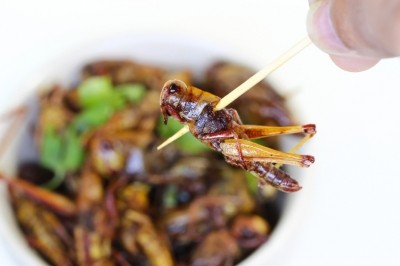The ultimate taste test: Insect burger, plant burger or meat burger?

Insects are increasingly promoted as a sustainable alternative to both meat and even soy. Raising them does not compete with existing farmland nor does it require forests to be cleared, and they have an excellent feed conversion rate unlike livestock for meat and dairy.
But any mention of insects as a viable protein alternative is more often than not dominated by the problems in overcoming the ‘yuck factor’.
Yet Belgian researchers who conducted three rounds of taste testing (a blind test, expected taste test and informed test) have found there could be hope yet for bug burgers.
Battle of the burgers
Although the insect burger was outperformed by the meat burger during the blind test, acceptance and overall liking increased when the young adults taking part in the study –seen as being the target consumers for alternative proteins – were told what was in it: 31% mealworms.
As well as being aware of the ingredients, they were given some general information about insect protein, namely that insects are a good source of high-value protein; they are a sustainable food choice due to an efficient feed conversion and small space requirements, and that the Belgian food safety authority approved them for human consumption back in 2014.
“A potential explanation for this […] is that young adults might be more open to try food products prepared with insects and/or are more willing to compromise on taste if informed about other (non-sensory) benefits associated with the product,” writes lead researcher Schouteten of the Department of Agricultural Economics at Ghent University.
Interestingly, insect burgers were less associated with ‘distrust’ when the participants knew were eating a bug burger than during the blind test.
The perceived nutritiousness of the insect-based burger was also significantly higher than the meat-based burger during the informed condition. “This yields potential for the future positioning and marketing of insect-based food products,” say the researchers.
However, the consumers did not expect to like the mealworm burger. This means that for insect-based foods to become successful on the market, potential consumers must be given an opportunity to taste them so that the positive emotions associated with the product replace the negative expected emotions, say the researchers.
The insect burger was also described as being drier and less juicy than its meaty competitor, so new product developers for insect-based foods must really focus on improving the sensory qualities, a major driver of food choice. “This is particularly so if they want to position their product as an alternative to meat, because resemblance to meat and its sensory quality is crucial for consumer acceptance,” write the researchers.
According to Bart Mertens, manager of BenSBugS, the Belgian company which supplied the insect burger, taste is the most important factor in the rapidly evolving insect sector, and innovation is essential. "Information about sustainability, safety and nutrition of insects is a rational conviction of the consumer after he has already eaten. What’s most important is to have a good product that consumers find enjoyable and tasty. Then the consumer will only rational attempt to explain why he wants to continue to eat insects. This information is therefore necessary, but to convince people to eat the product, a tasty product is needed."
"The burger [used in the experiment] is still the only product that contains 30% insect in a processed, invisible manner, where other companies process 10 - 15% insect. BenSBugS is leading there and we want to retain that position through innovation," he told FoodNavigator.
The study
A total of 97 young men and women with a mean age of 27 years old took part in the experiment.
They were given three commercially-available burgers to taste: a ‘Gourmet Garden’ plant-based burger which contained 19% vegetable protein from soy and wheat; a meat-based Beckers burger which contained 71% chicken and 9% pork; and an insect burger from Ben’s Bugs which contained 31% mealworms. They then rated their expected reactions, tasted the burgers in an informed session where they were told the ingredients of the burgers, and given additional information.
All burgers were frozen before to ensure a similar sensory quality.
They were asked to rate overall liking, perceived quality and nutritiousness, sensory profile and their emotional reaction.
To assess the sensory characteristics of the burgers the subjects chose from the following words: aftertaste, brown colour, dry, granular, homogeneous, juicy, meat aroma, meat flavour, nutty flavour, off-flavour, salty, soft.
For their emotional reaction they chose from: contented, disappointed, discontented, disgust, dissatisfied, distrust, energetic, fear, glad, happy, merry, pleasant surprise and worried.
Schouteten and his team of researchers suggest further research should focus on performing consumer taste tests in other countries as well as in real-life conditions. Offering people samples in restaurants, food fairs or supermarkets, rather than in a research laboratory, would give a more accurate idea of acceptance levels, they say.
Despite the positive signs, entomophagy is still in its infancy in Europe, and even among the young participants subset perceived to be more adventurous eaters than the general populace, around 10% refused to eat the insect burger during the informed session (although they had already unknowingly eaten it during the blind test).
Source: Food Quality Preference
Published online ahead of print: 25 March 2016, doi:10.1016/j.foodqual.2016.03.011
"Emotional and sensory profiling of insect-, plant- and meat-based burgers under blind, expected and informed conditions"
Authors: J. Schouteten, H. De Steur, S. De Pelsmaeker et al.
























